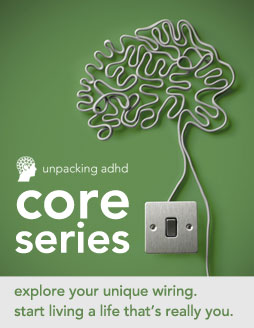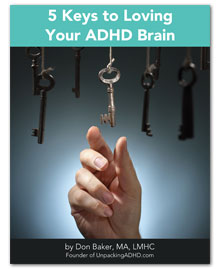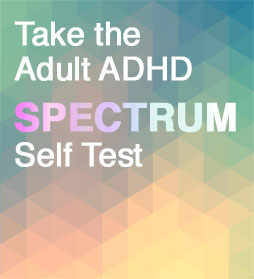In my 18 years as an Adult ADHD specialist, most of my clients have also struggled with anxiety. ADHD and anxiety are considered separate diagnoses, but let’s step back for a minute and acknowledge how intricately connected they are.
It makes perfect sense that many of us living with the traits of ADHD feel chronically anxious. We are constantly struggling to compensate for our Executive Function challenges in daily life. It’s stressful to force ourselves to attend to things that don’t easily hold our interest. It’s stressful trying to be organized with our time and our stuff, to modulate our impulses, to get things done, to sit still, to pull ourselves away when we’re in a deep dive, to keep our promises, and so on.
Often anxiety shows up in questions that play on repeat:
- Have I forgotten something?
- Am I keeping track of everything?
- What’s going to go wrong now?
These recurring questions can reflect an almost physiological experience of uncertainty and self-doubt. It’s a chronic vigilance, a perpetual scanning of the horizon, always looking for where you’re going to “screw up” next.
If this has always been your experience, you may not even be aware that you live on high alert. Before my ADHD diagnosis, I didn’t think much about being anxious, but the truth is that I had significant anxiety all the way back to childhood. My jaw used to lock from stress. My Executive Functioning would shut down before presentations or job interviews. I’d walk in a blank slate, totally unable to remember what I’d prepared to say. On a few occasions, I even had panic attacks that put me in the ER.
It was only after I got my ADHD diagnosis and started getting treatment that I was able to get a little distance and see how much anxiety was part of my daily experience. It didn’t go away just because I saw it, but I was able to face it with a more rational mind and begin to address it.
Strategies for Managing Anxiety
Two concepts have been extraordinarily helpful to me in managing my anxiety. Both are about reducing the power anxiety has over you by putting it in context.
1. “This will pass.”
However anxious you feel, there is a beginning and an end to the feeling. Whether you’re experiencing free-floating anxiety during a difficult life transition or a spiraling panic attack, repeating the simple mantra “this will pass” can help you find your way back to peace of mind. At the very least, it will give you something solid to hold on to until your emotions level out. With practice, it can be a bridge that helps you get back to a less anxious baseline.
2. “The fastest way out is through.”
When you’re anxious about something in particular — such as a work project you need to get done or a difficult phone call you need to make — it’s almost always better to just do the thing.
We tend to think that avoiding the object of our anxiety will keep us from feeling even more excruciating anxiety. In truth, avoidance just keeps you stuck in the threshold of experience where anxiety runs the show. Plus, it wears away at your confidence over time because you’re letting anxiety steal your personal power, your sense of agency.
Stepping into something, making choices even though it’s scary, is better than feeling paralyzed. You won’t always make the right choices. Things won’t always turn out peachy-keen. But you may be surprised how often reality turns out to be less awful than your anxious mind anticipated.
Daily Habits to Reduce Anxiety
Just like with managing ADHD traits, managing anxiety is largely about building up habits that support you. In fact, many of the same strategies can help with both anxiety and ADHD challenges.
Here are some evidence-based strategies to try, inspired by this longer list:
- Breathe deeply. Deep breathing stimulates your parasympathetic nervous system to calm you down. Whenever you notice feelings of anxiety throughout the day, breath in slowly through your nose, completely filling your lungs and belly. Then hold for a second or two before letting your breath out slowly through your mouth. If possible, continue this for a few minutes or more. Try matching the lengths of your in- and out-breaths to a count of four: “In, 2, 3, 4. Hold. Out, 2, 3, 4”
- Take a walk or work out. Research has shown that engaging in aerobic activity for as little as 5-10 minutes can elevate your mood and relieve anxiety. For best results, do the activity outside, making an effort to be mindful of your surroundings.
- Practice gratitude. Taking the time to consciously appreciate the good things in your life has many benefits and reducing anxiety is a big one. It’s all about perspective. Challenging things don’t look so bad when you pile up lots of good things next to them.
- Tidy up. The idea here isn’t to keep your environment perfectly clean and orderly—that might send your anxiety into overdrive! But the next time you feel anxious, try sorting out a single drawer, clearing off your desktop, or just doing the dishes. Tidying up is a practical way to increase your overall sense of calm, order, and control.
- Get creative. Sing, dance, draw, color, journal, start a scrapbook, or make a vision board. Don’t worry about the results or what anyone else might think. Just make time to express yourself. Venting your energy and emotions in a healthy way can be a powerful remedy for the anxious mind. And if you gain insight that helps you achieve your dreams, that’s even better!
How about you? Is anxiety a theme in your life? What strategies have you found helpful? Take a minute and comment. I’d love to hear from you.
Don Baker, MA, LMHC
I’ve been leading groups for adults living with the traits of ADHD for more than 15 years. I am a licensed counselor in the state of Washington, and I received my own diagnosis of ADHD in 1997. I am passionate about sharing cutting edge information about ADHD wiring and helping people with ADHD connect with others in our “tribe.” I created the Unpacking ADHD Core Series, a flexible roadmap for adults with ADHD.





